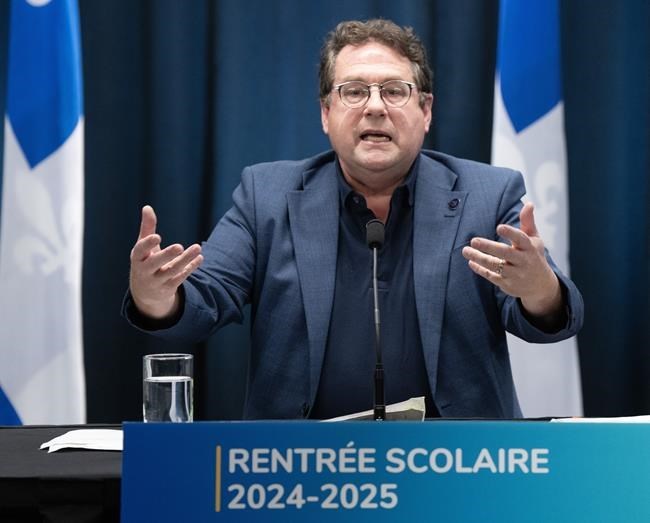
Quebec Education Minister Bernard Drainville gives an update on this year's back to school situation during a news conference Friday, Aug. 16, 2024, in Montreal. THE CANADIAN PRESS/Ryan Remiorz
September 08, 2024 - 7:36 AM
MONTREAL - Quebec's school year started on a familiar note: thousands of teaching spots were unfilled, and the provincial government had to defend itself for its failure to solve the problem.
But as politicians continue to point to immigration — a common justification for the province's ills — as the main culprit, education experts say newcomers are not the underlying cause of the widespread teacher shortages.
"There has been a significant increase in the number of children who need a teacher because of the explosion in the number of immigrants," Quebec Premier François Legault told reporters last week, despite also mentioning working conditions and salaries as other reasons the education system is lacking personnel.
In mid-August, Quebec Education Minister Bernard Drainville said there were 20,000 more students enrolled than last year, about 80 per cent of whom are newcomers to the province. With about 5,700 teaching positions unfilled, he called on the federal government to "get control of the immigration process to reduce temporary immigration in Quebec, particularly asylum seekers."
Statistics from last week showed 1,957 teaching positions across the education system had yet to be filled.
Drainville's math, however, doesn't add up, says Diane Querrien, professor in the department of French studies at Montreal's Concordia University.
“Even if you go with the worst-case scenario, meaning that the 20,000 more students are all immigrants, it doesn't make sense,” Querrien said, explaining that dividing that figure by the roughly 5,700 unstaffed positions would mean hiring one teacher for groups of only three to four students.
The Canadian Press asked the Quebec Education Department for clarity, but it did not respond to a request for comment.
Immigration, Querrien added, doesn't explain why some outlying regions, which receive fewer immigrants than do big cities, are also short on teachers — and have been for years.
Mélanie Hubert, president of teachers union Fédération autonome de l'enseignement, says it's true that a rise in the number of immigrant children requires more staff in French-language schools. But Quebec has done little to replace a generation of retiring teachers, she lamented.
“As long as we have a lot of people retiring and fewer people coming out of university, we're bound to have a shortage of teachers. And that's something we could have planned for,” she said.
“Maybe we wouldn't be in the situation we're in now, and we'd be able to absorb the number of students arriving from immigrant families.”
A teacher shortage is also being felt in the province's English schools, despite the fact Quebec's strict language laws force the vast majority of immigrants to enrol their children in the French system.
Steven Le Sueur?, president of the Quebec Provincial Association of Teachers, said the uptick in immigrant students has had “minimal” impact on Quebec’s English schools and yet they are still searching for qualified teachers. As of Friday, Le Sueur? said 200 positions were unfilled.
Poor working conditions and low pay over the past two decades has resulted in fewer people entering teaching programs and many educators throwing in the towel shortly after they enter the system. “We're losing 25 per cent of our new teachers within the first five years, so it's something that needs to be addressed,” Le Sueur? said.
University of Sherbrooke professor Philippa Parks, who studies the reasons teachers leave the profession, thinks Le Sueur?'s 25 per cent estimate might be on the conservative side; she said the statistics vary, but it could be as high as 50 per cent.
Immigration is “a drop in the bucket,” Parks said. “I think it's a little bit of dog whistling and disingenuous here because it is one of many factors.”
The main one, she said, is teachers not getting the support and training needed in the classroom, especially after reforms bringing students with learning and physical disabilities who had previously been educated separately into the same classrooms as the general population.
The other issue, Parks says, is that teaching is no longer the middle-class profession with status it used to be. “I started teaching in 1998 and I could buy a house. I actually put down a down payment with my salary as a teacher and of course things have changed dramatically.”
Despite recent salary increases — 17.4 per cent over five years — after thousands of teachers went on strike in the province last year, Le Sueur? and Parks say it will take time to attract more teachers to the profession and more needs to be done to make the day-to-day lives on educators easier.
University of Ottawa emeritus professor François Rocher, who researches immigration and Quebec nationalism, says the current teacher shortage is “just another example of how Coalition Avenir Québec has framed the issue of immigration."
“Immigration has been used as a cause for many other ‘problems’ that we have seen in Quebec,” he said, adding that the CAQ has also pinned blame on immigrants for the province’s housing crisis, a decline in the use of French in Quebec and increased demands for health-care services.
This report by The Canadian Press was first published Sept. 8, 2024.
News from © The Canadian Press, 2024